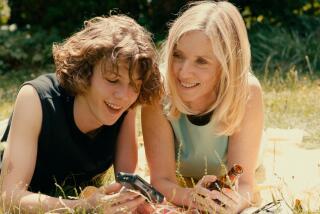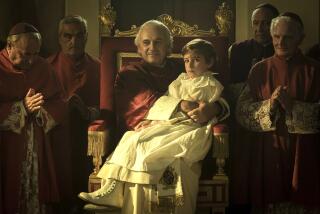Movie review: ‘Sarah’s Key’
“Sarah’s Key” is more powerful than you expect, maybe even more powerful than it should be. An emotional detective story based on an international bestseller by Tatiana de Rosnay, its Holocaust-connected narrative goes back and forth between moments of strength and those that fall flat. The uninspired elements encourage you to dismiss it, but the compelling sequences won’t allow that to happen.
Starring Kristin Scott Thomas as an American journalist living in Paris, “Sarah’s Key” also goes back and forth between events in 2002 and what happened 60 years earlier during the city’s infamous Vélodrome d’Hiver roundup of July 16, 1942, an event that is little known in this country and for many years was not mentioned in France either.
On that date, French officials and police, not Germans, rounded up 13,000 of the city’s Jews and herded them together for days in horrible conditions in one of the city’s indoor bicycle-racing tracks before dispatching them first to a transit camp and finally to Auschwitz.
The gravity of this event was not fully acknowledged until 1995, when President Jacques Chirac famously apologized for French complicity, so it’s no surprise that (with such exceptions as Marcel Ophüls’ “The Sorrow and the Pity” and Joseph Losey’s “Mr. Klein”) it hasn’t been the concern of many French films.
But it’s not only the newness to movies of these events that gives “Sarah’s Key” its impact, but it’s also the way Gilles Paquet-Brenner, a French director whose projects are ordinarily purely commercial, has conceived of and shot them.
Paquet-Brenner (who co-wrote the adaptation with Serge Joncour) starts the film on that July day in 1942 in the Marais district apartment of the Starzynskis. With the family being rounded up under frightening circumstances, 10-year-old Sarah (an exceptional Mélusine Mayance) impulsively instructs her younger brother to hide in the bedroom cupboard. She then locks him in, instructing him not to leave until she comes to get him.
“Sarah’s Key” is at its best in detailing with great skill what happens to this young girl and her parents over the next several days, starting with the nightmarish situation both at the velodrome, known informally as the Vél d’Hiv, and the transit camp at Beaune-la-Rolande, where Sarah and her family are sent.
The pure maddening chaos of these situations, their urgency, terror and violence, are compellingly conveyed by Paquet-Brenner and his cinematographer, Pascal Ridao, who shot all the 1942 action with a handheld camera to increase intensity. The specificity and the tension of these scenes, especially one where children are separated from their mothers, create an honestly earned connection.
These sequences don’t come at us all at once; they alternate between those set in 2002 involving Scott Thomas’ Julia Jarmond, living in Paris with a French architect husband, who persuades her magazine to let her do a major story on the 60th anniversary of the Vél d’Hiv events.
In the commercial fiction contrivance that is the heart of the novel’s success, Julia soon finds out that her husband’s family has a connection to that Marais apartment forcibly evacuated by the Starzynskis. She becomes understandably obsessed with finding out both the family’s role in that long-ago situation and what finally happened to 10-year-old Sarah and the brother hidden behind the key.
Though Scott Thomas is fluent and on target acting in both English and French, “Sarah’s Key” is not equally involving in both languages. On the one hand, obviously, we can’t help but share journalist and wife Julia’s determination to find the truth, and that want-to-see gives this film an effective engine.
But the 2002 sequences, which feature conversations in English with work colleagues and others, are so conventionally written and directed that they come off as flat and unconvincing. As is often the case with filmmakers working in a language not their own, these scenes feel like they’re not just in another tongue, they’re in another movie.
These sequences are a big part of “Sarah’s Key” and a considerable obstacle in the way of the film’s effectiveness. Finally, however, the historical situations have enough impact to overcome the at times sentimental contrivance of the contemporary material.
It also helps to have strong themes, which this film does. How much do we have to be products of our history? Are there limits to our ability to make new lives? To what extent is escape from the potent pull of the past possible? Just asking these questions, even in the context of melodramatic filmmaking, is something of value.
More to Read
The biggest entertainment stories
Get our big stories about Hollywood, film, television, music, arts, culture and more right in your inbox as soon as they publish.
You may occasionally receive promotional content from the Los Angeles Times.











